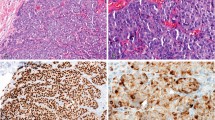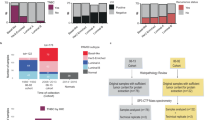Abstract
The expression of the protease cathepsin-D has been evaluated using an immunohistochemical technique with a polyclonal antibody in paraffin-embedded tissue from 359 patients treated between the years 1975-1981 for Stage I and II breast cancer. One hundred and twenty seven patients (35%) have strongly positive, granular staining, 138 (38%) are intermediately stained in the cytoplasm, and in 94 (26%) no staining is observed. There is a strong positive association between expression of cathepsin-D and the presence of tumour in axillary lymph nodes (P < 0.006). Expression of the protease is associated with significantly poorer survival of patients in univariate analysis (P = 0.025); however, this is not independent of other tumour variables.
This is a preview of subscription content, access via your institution
Access options
Subscribe to this journal
Receive 24 print issues and online access
$259.00 per year
only $10.79 per issue
Buy this article
- Purchase on Springer Link
- Instant access to full article PDF
Prices may be subject to local taxes which are calculated during checkout
Similar content being viewed by others
Author information
Authors and Affiliations
Rights and permissions
About this article
Cite this article
Winstanley, J., Leinster, S., Cooke, T. et al. Prognostic significance of cathepsin-D in patients with breast cancer. Br J Cancer 67, 767–772 (1993). https://doi.org/10.1038/bjc.1993.139
Issue Date:
DOI: https://doi.org/10.1038/bjc.1993.139
This article is cited by
-
Correlation between laminin and cathespin D expressions in breast carcinoma
Chinese Journal of Cancer Research (2006)
-
Cathepsin-D, urokinase plasminogen activator and type-1 plasminogen activator inhibitor in early breast cancer: an immunohistochemical study of prognostic value and relations to tenascin-C and other factors
British Journal of Cancer (1999)
-
Cathepsin D immunoreactivity in ovarian cancer: Correlation with prognostic factors
Pathology & Oncology Research (1998)
-
Immunohistochemical localization of lysosomal cathepsin D in schwannomas
Brain Tumor Pathology (1997)
-
Cortical cathepsin D activity and immunolocalization in Alzheimer disease, critical coronary artery disease, and aging
Molecular and Chemical Neuropathology (1996)



